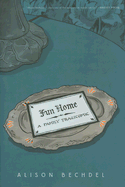
Graphic novels have not been high on my to-read list; after Maus, nothing seemed compelling enough to get my attention. Since there are now numerous graphic novels, I decided to look again. Where to start? How to assess? I know very little about this genre/art form, so decided to fall back on the old "I don't know art, but I know what I like" strategy--pathetic, yes, but a place to start. At the urging of Nick Di Martino, one of the most persuasive booksellers in the world, I read Fun Home: A Family Tragicomic and came up a winner. Not only is this book satisfying graphically, it also is a riveting memoir about a family trapped in lies.
Alison Bechdel, author of the long-running strip Dykes to Watch Out For, tells of her childhood with a closeted father, who taught English and ran a funeral home, the "Fun Home" of the book title. He spent much of his time restoring and decorating their Gothic revival house in rural Pennsylvania, and his obsession with this other "fun home" is revealing: "He used skillful artifice not to make things, but to make things appear to be what they were not." One of the panels shows a Christmas tree, with three children arranged at its base, the father standing back with a glass of sherry, assessing the picture they made: "Sometimes, when things were going well, I think my father actually enjoyed having a family. Or at least, the air of authenticity we lent to his exhibit. A sort of still life with children." As a child, Bechdel puzzled over a book of Addams Family cartoons--the captions made no sense, since both her family and the family business seemed to be mirrored in the drawings. She became obsessive compulsive, using counting, hand gestures and incantations; she had to kiss each of her stuffed animals at night, no matter how sleepy she was: "Though it verges on the bathetic, I should point out that no one had kissed me good night in years."
In college, some pieces of Alison's life fall into place when she realized that she is a lesbian. She came out to her parents in a letter, and after a few exchanges, her mother told her that her father had had affairs with other men. Her parents were also divorcing, leaving her to feel "upstaged, demoted from protagonist in my own drama to comic relief in my parents' tragedy." Four months later, her father was dead, killed by a truck as he crossed a street. Believing the death a suicide, Bechdel wondered if she caused her father's death by telling her parents she was a lesbian, opening the closet the entire family had been in. Or perhaps her father had timed his death to coincide with F. Scott Fitzgerald's, but "that would only confirm that his death was not my fault. That, in fact, it had nothing to do with me at all. And I'm reluctant to let go of that last, tenuous bond."
Her father read extensively, with a special fondness for Camus, Proust, Fitzgerald and Joyce; a love of literature is part of his legacy to his daughter. His other gifts are less clear, but Bechdel, searching for clues in his letters quoting from Ulysses and other novels, reflects on the idea that they were close, but not close enough. She decides, with wisdom and sadness, "I shouldn't pretend to know what my father was."--Marilyn Dahl

